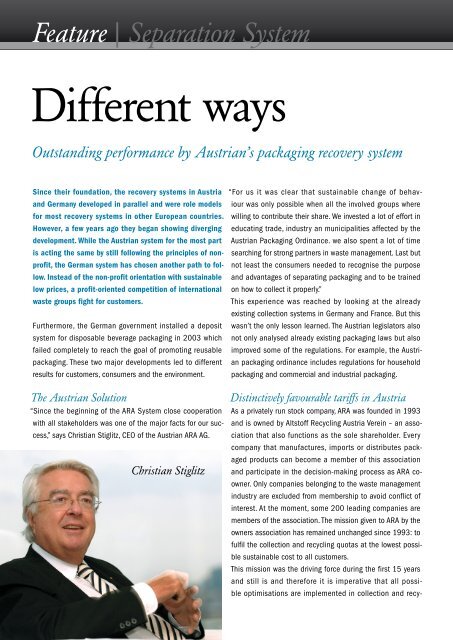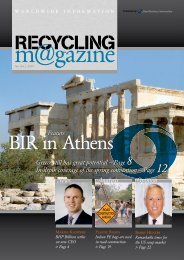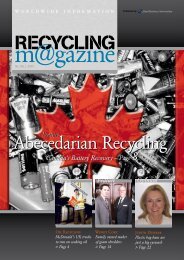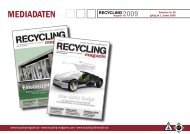please click here for the pdf-version - RECYCLING magazin
please click here for the pdf-version - RECYCLING magazin
please click here for the pdf-version - RECYCLING magazin
You also want an ePaper? Increase the reach of your titles
YUMPU automatically turns print PDFs into web optimized ePapers that Google loves.
Feature | Separation System<br />
Different ways<br />
Outstanding per<strong>for</strong>mance by Austrian’s packaging recovery system<br />
Since <strong>the</strong>ir foundation, <strong>the</strong> recovery systems in Austria<br />
and Germany developed in parallel and were role models<br />
<strong>for</strong> most recovery systems in o<strong>the</strong>r European countries.<br />
However, a few years ago <strong>the</strong>y began showing diverging<br />
development. While <strong>the</strong> Austrian system <strong>for</strong> <strong>the</strong> most part<br />
is acting <strong>the</strong> same by still following <strong>the</strong> principles of non-<br />
profit, <strong>the</strong> German system has chosen ano<strong>the</strong>r path to fol-<br />
low. Instead of <strong>the</strong> non-profit orientation with sustainable<br />
low prices, a profit-oriented competition of international<br />
waste groups fight <strong>for</strong> customers.<br />
Fur<strong>the</strong>rmore, <strong>the</strong> German government installed a deposit<br />
system <strong>for</strong> disposable beverage packaging in 2003 which<br />
failed completely to reach <strong>the</strong> goal of promoting reusable<br />
packaging. These two major developments led to different<br />
results <strong>for</strong> customers, consumers and <strong>the</strong> environment.<br />
The Austrian Solution<br />
“Since <strong>the</strong> beginning of <strong>the</strong> ARA System close cooperation<br />
with all stakeholders was one of <strong>the</strong> major facts <strong>for</strong> our success,”<br />
says Christian Stiglitz, CEO of <strong>the</strong> Austrian ARA AG.<br />
8<br />
Christian Stiglitz<br />
“For us it was clear that sustainable change of behav-<br />
iour was only possible when all <strong>the</strong> involved groups w<strong>here</strong><br />
willing to contribute <strong>the</strong>ir share. We invested a lot of ef<strong>for</strong>t in<br />
educating trade, industry an municipalities affected by <strong>the</strong><br />
Austrian Packaging Ordinance. we also spent a lot of time<br />
searching <strong>for</strong> strong partners in waste management. Last but<br />
not least <strong>the</strong> consumers needed to recognise <strong>the</strong> purpose<br />
and advantages of separating packaging and to be trained<br />
on how to collect it properly.”<br />
This experience was reached by looking at <strong>the</strong> already<br />
existing collection systems in Germany and France. But this<br />
wasn’t <strong>the</strong> only lesson learned. The Austrian legislators also<br />
not only analysed already existing packaging laws but also<br />
improved some of <strong>the</strong> regulations. For example, <strong>the</strong> Austri-<br />
an packaging ordinance includes regulations <strong>for</strong> household<br />
packaging and commercial and industrial packaging.<br />
Distinctively favourable tariffs in Austria<br />
As a privately run stock company, ARA was founded in 1993<br />
and is owned by Altstoff Recycling Austria Verein – an asso-<br />
ciation that also functions as <strong>the</strong> sole shareholder. Every<br />
company that manufactures, imports or distributes packaged<br />
products can become a member of this association<br />
and participate in <strong>the</strong> decision-making process as ARA coowner.<br />
Only companies belonging to <strong>the</strong> waste management<br />
industry are excluded from membership to avoid conflict of<br />
interest. At <strong>the</strong> moment, some 200 leading companies are<br />
members of <strong>the</strong> association. The mission given to ARA by <strong>the</strong><br />
owners association has remained unchanged since 1993: to<br />
fulfil <strong>the</strong> collection and recycling quotas at <strong>the</strong> lowest possible<br />
sustainable cost to all customers.<br />
This mission was <strong>the</strong> driving <strong>for</strong>ce during <strong>the</strong> first 15 years<br />
and still is and t<strong>here</strong><strong>for</strong>e it is imperative that all possible<br />
optimisations are implemented in collection and recy-





